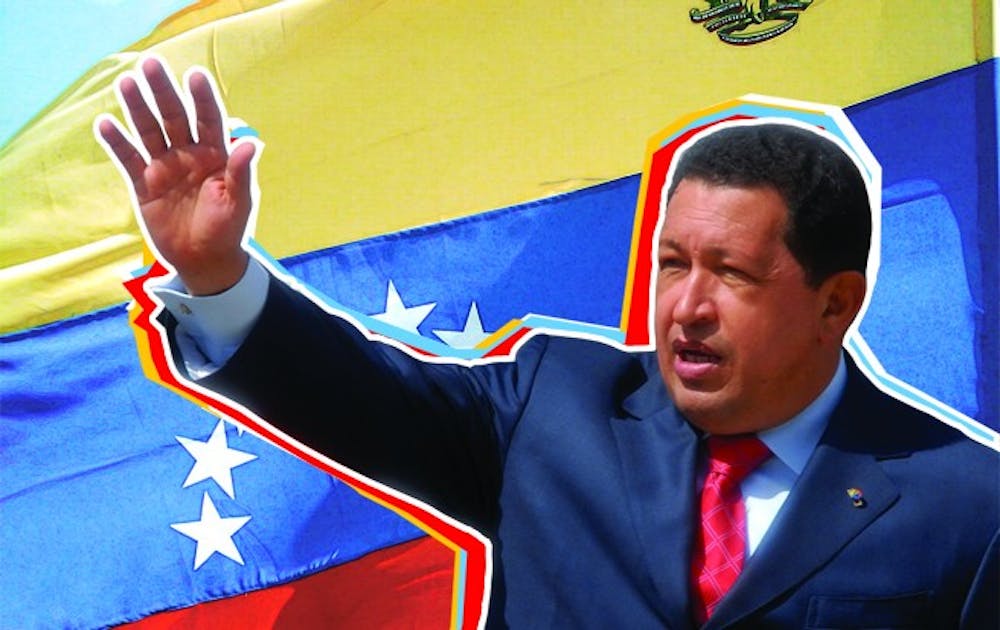A month before the presidential election in the United States, almost 15 million Venezuelan voters went to the polls for the first truly competitive presidential race in 14 years. The Venezuelan opposition to Hugo Chávez united behind an energetic and charismatic challenger, Henrique Capriles. After more than a decade of landslides in favor of Latin America’s foremost anti-American demagogue, polls predicted a tight contest. Americans have closely watched the country that forms the backbone of the region’s socialist bloc yet simultaneously earns 80 percent of government revenue from the more than one million barrels of oil it sells to the United States every day. The Venezuelan presidential election featured two extraordinary politicians, resulting in one of the most exciting recent political contests in the Western Hemisphere.
Uncertainty about Chávez’s health colored the entire race. After announcing in June 2011 that he underwent an operation to remove an abdominal tumor, the normally exuberant leader stepped away from the spotlight and spent much of his time undergoing cancer treatment in Cuba. Doctors and other political commentators routinely predicted his imminent death; a senior U.S. diplomat likened him to the Spanish legendary hero El Cid, leading his army into battle while mortally wounded, strapped into his saddle. For a time it seemed that the socialist leader might die at any moment without a viable successor to carry the banner of his United Socialist Party of Venezuela.
Chávez’s leadership was weakened even further by ballooning domestic crises. The Venezuelan Observatory of Violence reports that the national homicide rate quadrupled between 1998 and 2009. During that time, Caracas became the second-most violent city in the Western Hemisphere—surpassed only by Ciudad Juárez, the epicenter of Mexico’s drug war. Corruption has risen to the point that Transparency International, a nongovernmental organization that assesses corruption worldwide, ranked Venezuela the 10th most corrupt country in the world, worse than even Muammar Gaddafi’s Libya. Critics accuse Chávez of squandering the country’s immense oil revenues on inefficient and opaque social programs called misiones. Citizens complain about frequent electricity blackouts and shortages of basic goods in grocery stores.
Despite the extraordinary crises, 8 million Venezuelans reelected Chávez to a third six-year term. The incumbent won 55 percent of the vote to 44 percent for Capriles—an 11-point margin, winning 21 out of the 23 states. How could that happen?
Americans might wonder how an incumbent could be reelected in the current climate, but independent experts trust the results. Hal Brands, an assistant professor in public policy and history who specializes in Latin America, said he did not suspect any “cheating in the actual counting of votes.” Although Peter Kornbluh, a senior analyst at the nongovernmental National Security Archive, was concerned about violence against Capriles supporters at rallies, he does not question the validity of the election. Most importantly, Capriles and the opposition have accepted the reported results.
The ballots may have been counted honestly, but experts say that the campaign as a whole was not fair. Brands explains that “the playing field is not level” in Venezuela because Chávez uses state resources to reward his followers and punish those who vote against him. The president relies on massive oil revenues to fund social programs that have improved literacy and provided some services to the poor in a highly unequal country, but he ramps up social spending in election years to shore up support. He hosts a nationally televised show on which he rewards adoring voters for their loyalty with rent-free apartments and free refrigerators.
Kornbluh also underscores Chávez’s “domination of the press.” News outlets self-censor criticism of the president for fear of losing their media licenses, which the government must reapprove every year. Brands says that the incumbent’s media advantage in Venezuela overwhelms a sitting president’s advantage in the United States, pointing to state television’s “fawning” coverage. He also said that some Venezuelans remain fearful of voting against Chávez after the government leaked a list of millions of voters who supported a recall vote in 2004; many of those voters lost jobs and government benefits.
Additionally, the president’s personal popularity draws the votes of millions of Venezuelans, particularly poor citizens who feel that Chávez defends them from the forces of imperialism. Duke senior and Venezuela native Jean-Marc Goguikian concedes the president’s “genius” in cultivating a fervent base, calling him “a good communicator, a savvy speaker” who manages to “disassociate himself from the problems” that face his country by deflecting blame onto government ministers. Kornbluh says that “Chávez’s great accomplishment is mobilizing and empowering great masses of poor people” who feel invested in his continuing power. A strong majority of Venezuelans disapproved of the government’s performance on economic, security, and corruption issues in a 2011 poll, yet 64 percent of the country approved of Chávez himself.
Still, while Chávez won another six years in office on Oct. 7, his power at home and throughout the Americas has begun to recede. Although his margin of victory surprised most outside observers, it is certainly not the 63-to-37 spread he enjoyed only six years ago. This smaller margin points to the desire of more Venezuelans to change the current government—and Chávez might pay heed to the unprecedented six and half million votes for the opposition. Perhaps more importantly, Chávez’s popularity throughout the region has faded; President Barack Obama and center-left former Brazilian president Luiz Inácio Lula de Silva—better-known as “Lula”—are twice as respected based on a Barómetro poll. Brands asserts that the Venezuelan president “has lost the battle for Latin America” and ceded regional leadership to politically moderate and economically vibrant Brazil.
Get The Chronicle straight to your inbox
Signup for our weekly newsletter. Cancel at any time.

